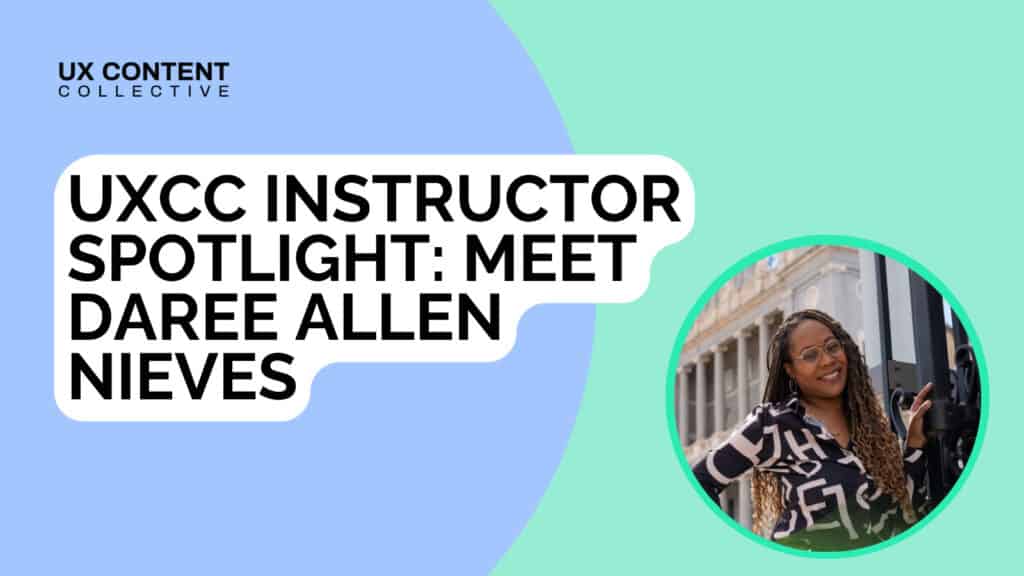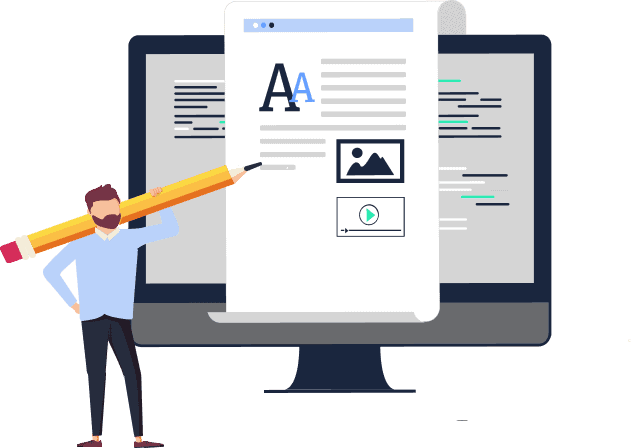

In this series, we ask our UXCC course instructors and graders to share their unique backgrounds, insights, and advice for fellow UX content people. This time, we chat with Daree Allen Nieves, UX Writer at Comcast.
I started UX writing in 2021, after leaving a 22-year career in technical writing with the same company. I admit, I hadn’t heard of UX writing until 2020! I was considering a career change to an adjacent writing field that uses writing and/or content strategy, so I explored instructional design first, and then scriptwriting. As a part-time voice actor, I read a lot of scripts. And I also considered conversation design because of that voiceover aspect.
When I started technical writing in the late 90s, I had a degree in it, but no one else did. A talent agency recruited me fresh out of college—I was only unemployed for 2 months. When I arrived, the other writers were at least 20 years older than me, and they had marketing or journalism backgrounds. My manager didn’t even have a bachelor’s degree. But they adapted their writing experience to technical writing. And I had to do the same for my transition into UX writing.
In both cases, I presented samples of my work, paid and unpaid, to demonstrate my skills, and after taking the UX Fundamentals course with UXCC (UXWC at the time), I was able to apply what I learned directly to my technical writing work. (The UX Writing for Technical Writers course was not available yet.)
I was brought in as a contractor to assist two other writers with content for a digital app for home internet (Xfinity), and products similar to Roku and other entertainment cable and streaming apps such as XClass TV and Peacock.
Those writers left shortly after I arrived, and I started supporting 10 teams on my own for 5 months (that’s not a typo). Then a new writer was hired to take over the entertainment area, and a few months later, I started sharing those 10 teams with them.
I like the variety! When I was interviewing, I didn’t think I would stay in the same field for UX as I did for technical writing. There are SO MANY industries that use and need us! But being able to work on products that the average person uses makes my work seem so much more tangible and relevant, even when I’m not explaining what I do to family and friends.
UX. Is. Everywhere! UX writers work all over the world, and many write in English when it’s not their primary language. Very impressive!
It’s really expanded my mind to not only consider varied professional backgrounds, cultures and languages of our students, but also themes like accessibility (something I didn’t think about as a tech writer), and diversity and inclusion (especially as a Black woman in corporate America).
To me, the biggest things about working as a UX writer have very little to do with writing itself:
Being able to articulate your reasoning for your copy and design choices is absolutely paramount to this position. Any writer knows that your first draft is never “it,” because copy is never really final–it’s either a draft or it’s approved (thanks Kate Lawton). But no matter what, you have to explain and sometimes defend why a button should be placed in a certain area, or why, for example, to choose a verb like “View” or “Review” for a CTA instead of “See.” And it has to be about more than just because of your company style/brand guidelines. We have to always think about what our users are trying to do, and what they need to do as quickly and easily as possible.
You also need to be able to empathize with your colleagues, not just your users. You can imagine how hectic it is for me to support 10 teams, but I also think about my design and product partners, some of whom are also overworked or overwhelmed. Don’t take it personally if someone doesn’t give you feedback within a day or two, or gives you less-than-stellar feedback on your copy. It’s not about you!
The biggest challenge I’ve had has unfortunately not been resolved, but I’ll share:
The entertainment areas I worked in were disorganized and frankly, a little chaotic. I tried, along with my manager and my Creative Director, to work with the project managers for those products to make sense of requests, but they often wanted copy requests to be completed immediately the same day, or the next day. I had no view into the long-term plan or what was going on behind the scenes. Then after completing several requests with a quick turnaround, I’d either hear crickets, or someone else would decide to go with some other copy that they could have chosen in the first place. I don’t think some of our partners understand what goes into lots of on-demand, fast requests.
Also, sometimes you can get into a rut. But you don’t have to come up with all of the content ideas alone! Encourage your product and design partners to give suggestions, or run your work past other writers on your team for help or to brainstorm.
UXers are advocates by definition, so we must not be afraid to speak up. We empathize with users of our products and always try to find ways to help them complete a task or get the information they’re looking for. We are inclusive and consider other abilities, races, genders, etc., and don’t design with just one person in mind. You can use examples in your everyday life where this isn’t true, to show how good UX can improve the experience. Then add it to your portfolio.
I challenge the idea that you have to break into UX to be a part of it. You don’t have to break in. Walk in with your head held high, without impostor syndrome. Just recognize what you don’t know, be open to learning, and speak up with what you do know. Apply UX principles to your current work wherever you can, and continuously add the best examples to your portfolio. Because when you stay ready, you never have to worry about getting ready.
Daree Allen Nieves is a contract UX writer at Comcast. Connect with her on LinkedIn.

Explore our content design and UX writing training:
Get our weekly Dash newsletter packed with links, regular updates with resources, discounts, and more.
